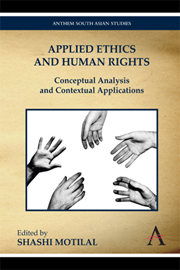Book contents
- Frontmatter
- Contents
- Preface
- Introduction
- Part One Rights, Obligations and Responsibilities
- Part Two Human Rights Issues
- 10 Fragile Identities and Constructed Rights
- 11 Affirmative Action: Compensation or Discrimination?
- 12 Ethics, Human Rights and the LGBT Discourse in India
- 13 Distributive Justice: Locating in Context
- 14 Punishment and Human Rights
- 15 Rights of the ‘Mad’ in Mental Health Sciences
- 16 Choice, Life and the (m)Other: Towards Ethics in/of Abortion
- 17 The Nationalist Project and the Women's Question: A Reading of The Home and the World and Nationalism
- 18 On the Idea of Obligation to Future Generations
- 19 Morality in Cyberspace: Intellectual Property and the Right to Information
- 20 Violence – A Right to the Survival of the Self?
- 21 ‘Moral Obligation’ to Fight for the Prevention of Greater Calamity: A Debate between Sādharana Dharma and Sva Dharma
- 22 Globalisation and Human Rights
- Notes on Contributors
18 - On the Idea of Obligation to Future Generations
from Part Two - Human Rights Issues
Published online by Cambridge University Press: 05 March 2012
- Frontmatter
- Contents
- Preface
- Introduction
- Part One Rights, Obligations and Responsibilities
- Part Two Human Rights Issues
- 10 Fragile Identities and Constructed Rights
- 11 Affirmative Action: Compensation or Discrimination?
- 12 Ethics, Human Rights and the LGBT Discourse in India
- 13 Distributive Justice: Locating in Context
- 14 Punishment and Human Rights
- 15 Rights of the ‘Mad’ in Mental Health Sciences
- 16 Choice, Life and the (m)Other: Towards Ethics in/of Abortion
- 17 The Nationalist Project and the Women's Question: A Reading of The Home and the World and Nationalism
- 18 On the Idea of Obligation to Future Generations
- 19 Morality in Cyberspace: Intellectual Property and the Right to Information
- 20 Violence – A Right to the Survival of the Self?
- 21 ‘Moral Obligation’ to Fight for the Prevention of Greater Calamity: A Debate between Sādharana Dharma and Sva Dharma
- 22 Globalisation and Human Rights
- Notes on Contributors
Summary
Until the first quarter of the twentieth century it looked obvious that mankind would continue to exist for all time to come. Development of nuclear weapons compelled man to get worried about the possibility of extinction of the human race. Increase in the population, resulting in environmental pollution and accompanied by limited resources, has been the major cause of the worries human are faced today. Naturally in this context, the question arises whether the present generation has an obligation to future generations so that our sacrifice could ensure the continued existence of the human race, preventing it from future extinction. People have started pondering over this question since there are events that could threaten human survival. Since the existence of future generations in many ways depend on what we do now, the question whether or not we should try to prevent the extinction of mankind is an important issue, not only of pure academic interest but with direct consequences on many contemporary problems as well.
The central question in this discourse seems to be whether we, as the present generation, have any moral obligation and to what extent we have the duty, if we have any duty at all, to the future generation, so that it would be morally incumbent for us to make sacrifices now to bring happy people in the world or to avoid them from being brought to the world.
- Type
- Chapter
- Information
- Applied Ethics and Human RightsConceptual Analysis and Contextual Applications, pp. 247 - 252Publisher: Anthem PressPrint publication year: 2010



